Hi there, pet lovers! 🐍
Carpet Pythons (Morelia spilota) are among the most visually striking and fascinating snakes in the reptile-keeping world. Known for their stunning patterns, manageable size, and active personalities, they have become a favorite among intermediate and experienced snake enthusiasts. But are they the right pet for you? In this comprehensive review, we’ll explore everything you need to know about Carpet Pythons, from their temperament and care requirements to their availability and costs. Whether you’re considering adding one to your collection or simply curious about these captivating snakes, this guide will help you make an informed decision.
Overview
Carpet Pythons are semi-arboreal snakes native to Australia, New Guinea, and some surrounding islands. They are known for their beautiful patterns, which vary depending on the subspecies, and their slender, agile bodies. These snakes are active, curious, and can make excellent display animals due to their striking appearance and engaging behavior. Here’s a quick summary of what makes them stand out:
- Handling and Temperament: Generally manageable but can be defensive as juveniles. With regular handling, they often become docile adults.
- Care and Maintenance: Moderate care requirements, including specific humidity, temperature, and enclosure setup.
- Health and Durability: Hardy and long-lived, but sensitive to improper husbandry.
- Availability: Widely available through breeders and reptile expos, with a variety of subspecies and morphs to choose from.
- Cost: Moderate initial investment for the snake and setup, but relatively low ongoing maintenance costs.
- Overall: A rewarding pet for snake enthusiasts with some experience, but not ideal for absolute beginners.
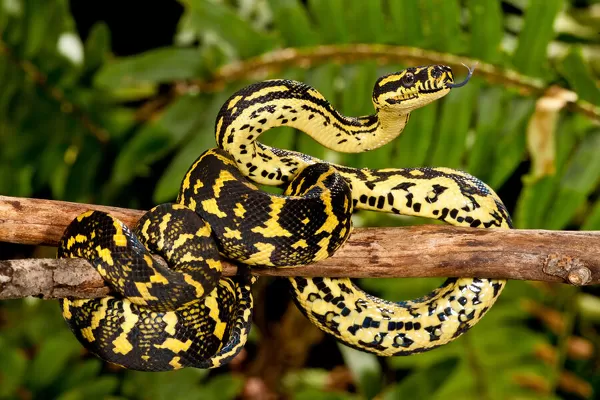
Why Choose a Carpet Python?
Carpet Pythons are ideal for those looking for a visually stunning, active, and interactive snake. Their unique patterns, ranging from bold blacks and yellows to intricate geometric designs, make them one of the most beautiful snakes in the reptile world. They are also known for their curious and exploratory nature, which can make them fascinating to observe and handle. While they require a bit more attention than some other species, their manageable size (typically 6–9 feet) and relatively straightforward care make them a great choice for intermediate keepers.
Handling and Temperament
Carpet Pythons have a reputation for being a bit feisty, especially as juveniles. However, with regular, gentle handling, they often calm down and become quite manageable as adults. Their temperament can vary depending on the individual snake and its subspecies, but most Carpet Pythons are inquisitive and active, making them a joy to interact with.
Personality Variations
- Juveniles: Young Carpet Pythons are often defensive and may strike or bite when feeling threatened. This is a natural behavior for a small snake in a big, scary world.
- Adults: With consistent handling, most Carpet Pythons become more docile and less defensive as they mature. They are known for their curiosity and love of exploration.
Handling Tips
- Approach Gently: Always approach your Carpet Python slowly and from the side, avoiding sudden movements that might startle them.
- Support Their Body: These snakes are semi-arboreal and appreciate being well-supported during handling. Let them wrap around your hands or arms to feel secure.
- Watch for Signs of Stress: If your snake seems tense or defensive, give them some space and try again later. Never force handling.
Biting
Carpet Pythons are not known for being aggressive, but they can bite if they feel threatened or mistake your hand for food. Their bites are not dangerous but can be painful due to their sharp teeth. With proper handling techniques, the risk of being bitten is minimal.
Care and Maintenance
Carpet Pythons are relatively hardy, but they do have specific care requirements that must be met to ensure their health and well-being. Their semi-arboreal nature means they need both ground space and climbing opportunities in their enclosure.
Enclosure Setup
- Size: A 4x2x2-foot enclosure is the minimum recommended size for an adult Carpet Python. Larger enclosures are always better, especially for more active individuals.
- Climbing Space: Provide plenty of branches, vines, and perches to allow your snake to climb and explore.
- Substrate: Use a substrate that retains humidity well, such as coconut husk or cypress mulch. Avoid loose substrates that could cause impaction if ingested.
- Hiding Spots: Include multiple hides on both the warm and cool sides of the enclosure to help your snake feel secure.
Humidity and Temperature
- Humidity: Maintain humidity levels between 50–70%, depending on the subspecies. Regular misting and a large water bowl can help achieve the right humidity.
- Temperature: Provide a temperature gradient with a warm side of 88–92°F and a cool side of 78–85°F. A basking spot should also be available.
Feeding
- Diet: Carpet Pythons are hearty eaters and thrive on a diet of appropriately sized rodents, such as mice or rats. Adults typically need to be fed every 10–14 days, while juveniles require more frequent meals.
- Supplements: No additional supplements are needed if feeding whole prey items. However, ensure the prey size matches the snake’s girth to prevent regurgitation.
Lighting
Carpet Pythons do not require UVB lighting, but providing a natural day-night cycle with ambient light can benefit their overall well-being. A heat source, such as a heat pad or radiant heat panel, is essential for maintaining the proper temperature gradient.
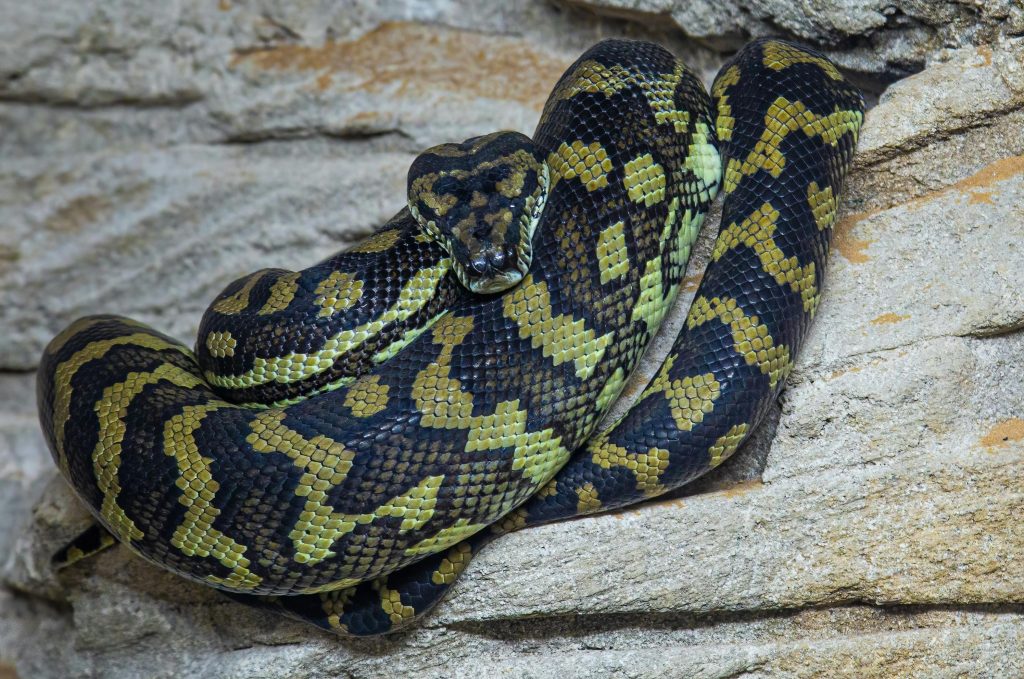
Health and Durability
Carpet Pythons are generally hardy and long-lived, with a lifespan of 15–20 years in captivity when cared for properly. However, they can be sensitive to environmental changes and improper husbandry.
Common Health Issues
- Respiratory Infections: Often caused by incorrect humidity or temperature levels. Symptoms include wheezing, mucus around the nostrils, and lethargy.
- Mites: These parasites can be introduced through unclean environments or new additions to your collection. Regular health checks and proper hygiene can prevent infestations.
- Obesity: Overfeeding can lead to obesity, especially in less active individuals. Stick to a regular feeding schedule and monitor your snake’s body condition.
Preventative Care
- Maintain proper humidity and temperature levels.
- Provide a clean and stress-free environment.
- Handle your snake gently and avoid overfeeding.
Availability and Cost
Carpet Pythons are widely available through reputable breeders, reptile expos, and online stores. They come in a variety of subspecies and morphs, each with its own unique patterns and colors.
Where to Buy
- Breeders: The best option, as breeders can provide healthy, well-started snakes with detailed care information.
- Reptile Expos: A great place to meet breeders and see a variety of Carpet Pythons in person.
- Pet Stores: Less ideal, but some stores may carry Carpet Pythons. Be sure to ask about the snake’s origin and health history.
Cost
- Snake Price: Standard wild-type Carpet Pythons typically cost between $150 to $200, while rare morphs or subspecies can range from $300 to $1,000 or more.
- Setup Cost: Expect to spend $300 to $500 on an appropriate enclosure, heating equipment, substrate, and other essentials.
Pros and Cons
Pros
- Stunning patterns and colors make them one of the most beautiful snakes available.
- Active and curious personalities are fascinating to observe.
- Manageable size and relatively straightforward care for intermediate keepers.
- Long lifespan (15–20 years) with proper care.
Cons
- Juveniles can be defensive and nippy, requiring patience and regular handling.
- Sensitive to environmental changes, requiring careful monitoring of humidity and temperature.
- Not ideal for beginners or those looking for a snake to handle frequently.
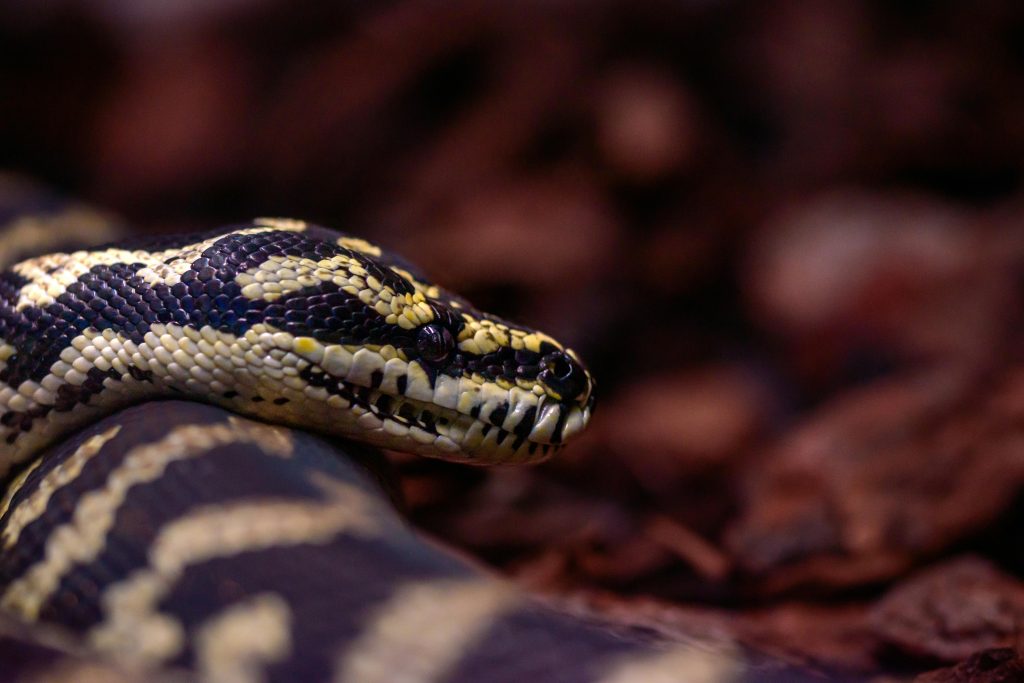
Final Thoughts
Carpet Pythons are a fantastic choice for snake enthusiasts who are ready to take on a moderate level of care. Their striking appearance, active nature, and manageable size make them a favorite among intermediate and experienced keepers. While they may not be the best choice for absolute beginners, those with some experience and a willingness to meet their care requirements will find them to be exceptional pets.
If you’re considering a Carpet Python, we recommend visiting a breeder or reptile expo to see these beautiful snakes in person. Their unique personalities and stunning patterns are sure to captivate you. With proper care and attention, a Carpet Python can be a rewarding and long-lasting addition to your reptile collection.
Have you owned a Carpet Python? Share your experiences and tips in the comments below! We’d love to hear how you care for your snake and what makes them special to you.
For more reptile care tips and reviews, stay tuned to our blog and don’t forget to subscribe to our newsletter! 🐍

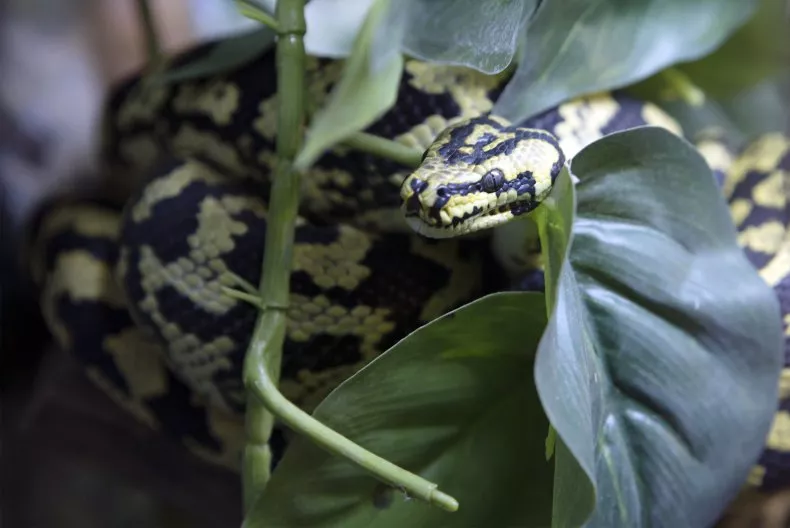

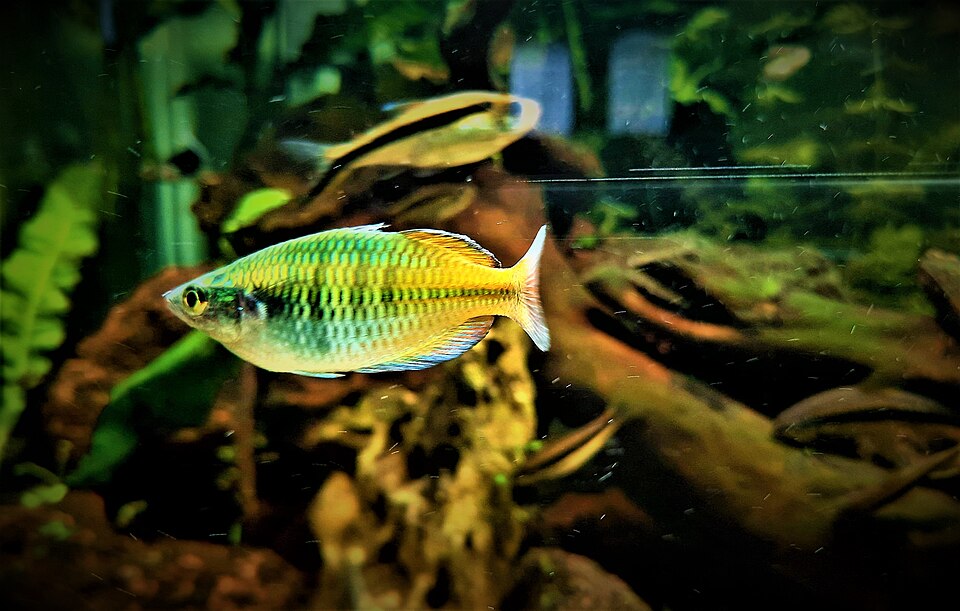
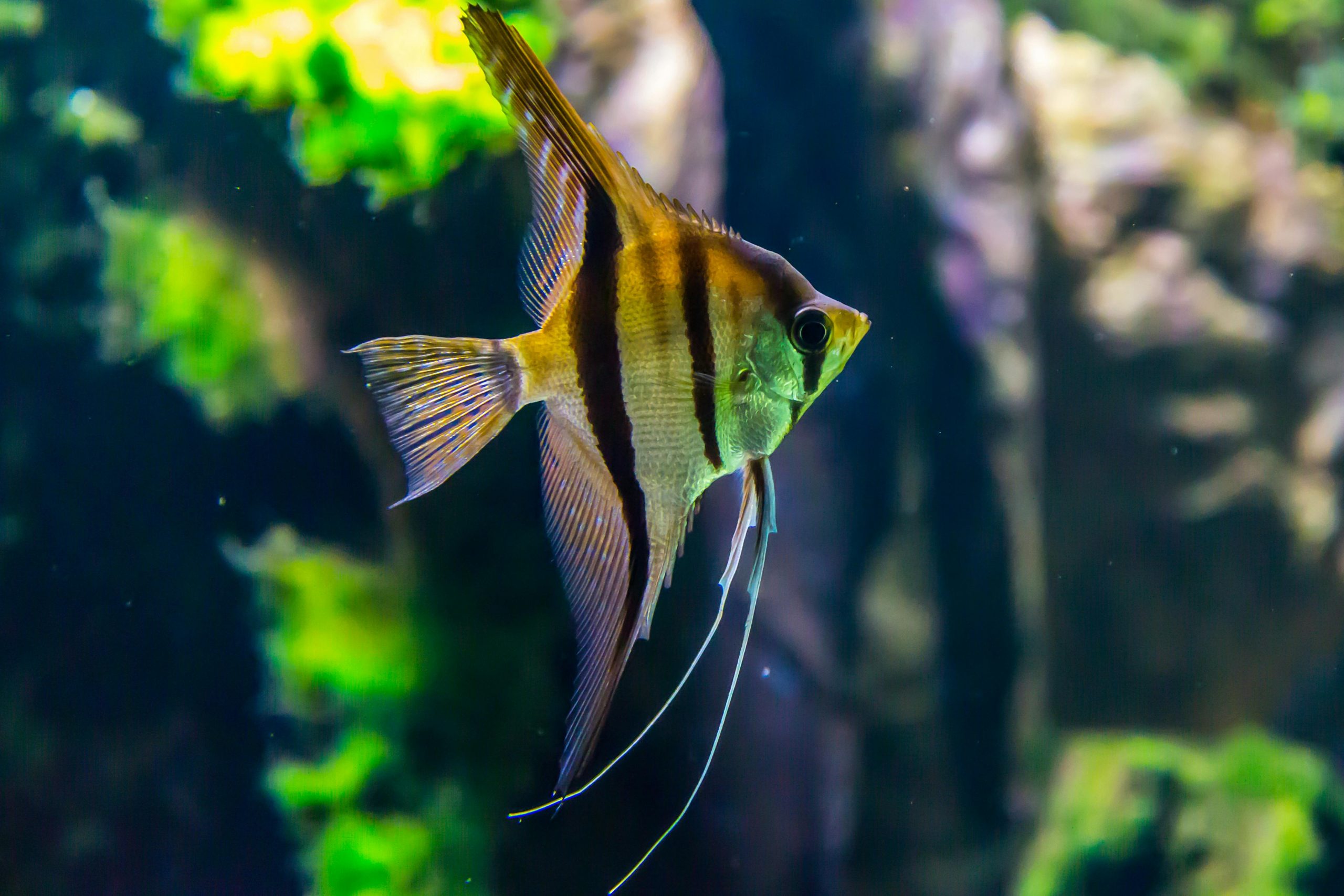
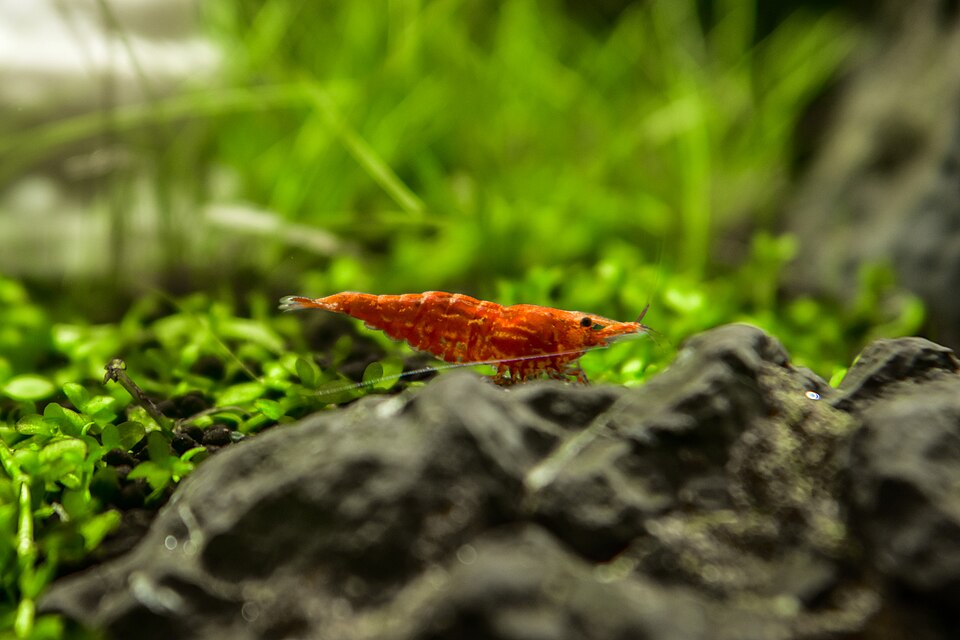

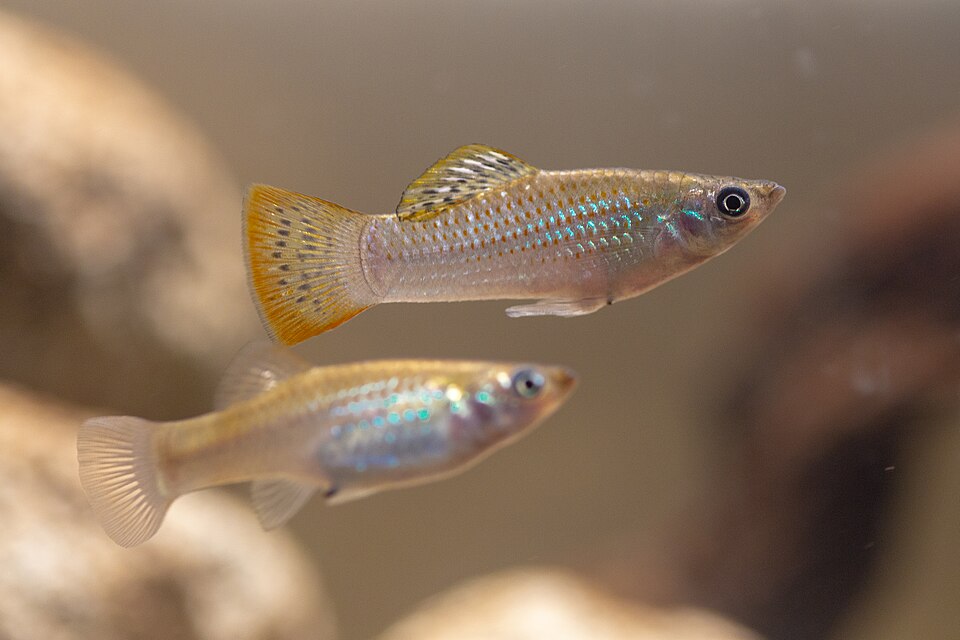
Leave a Reply